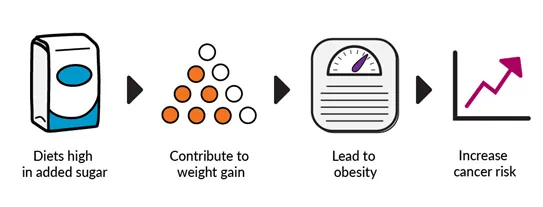Reduce added sugars
Not all sugar is the same
Sugar occurs naturally in foods such as fruit, milk and vegetables. These foods contain vitamins and minerals that your body needs. Don’t hesitate to eat them every day. Added sugars are used in cooking, baking and preparing foods. These added sugars are found as ingredients in most of the packaged food we eat – cookies, soft drinks, candy, cakes, pastries and other sweet treats, as well as non-sweet options like sauces and condiments.
Sugar and cancer
While sugar as an ingredient does not increase your risk of developing cancer, what it does to your body can. Foods and drinks with added sugar have lots of calories but usually contain few nutrients – and they don’t help you feel full for long. Eating foods with too much added sugar means you’re more likely to put on weight. And research shows that obesity increases your risk of cancer.
The World Health Organization and leading Canadian health organizations recommend that no more than 10% of our total daily calories should come from added sugar. Ideally, it should be less than 5%.
For an average 2,000-calorie-a-day diet, 10% is about 48 grams, or 12 sugar cubes.
One of the best ways to make sure you’re not eating too much sugar is to read nutrition labels. If sugar is one of the first few ingredients, the product is probably not a great choice.

Sugar has a lot of names
There are many types of sugar. If you see any of these names on a list of ingredients, you’ll know you’re eating sugar:
agave nectar, brown sugar, buttered syrup, dextrose, cane sugar, evaporated cane juice, fruit juice, lactose, galactose, maltose, raw sugar, demerara sugar, honey, ethyl maltol, icing sugar, white sugar, date sugar, glucose, corn syrup solids, cane juice extract, fructose, carob syrup, fruit purée, maple syrup, maltodextrin, molasses, golden syrup, high-fructose corn syrup, sucrose, turbinado sugar, treacle.
Skip the sugary drink
Sugary drinks have little or no health benefits, but Canadians sure drink a lot of them. In fact, sugary drinks are the single greatest contributor of added sugar in our diets!
Sugary drinks include:
- pop or soft drinks
- energy and sports drinks
- flavoured waters
- sweetened coffees and teas
- flavoured milk
- drinkable yogurt
- fruit drinks
- 100% fruit juice
6 tips to cut down on sugar
Sugar substitutes
Aspartame is a common artificial sweetener that’s been used in Canada since 1981. The International Agency for Research on Cancer (IARC) has said aspartame may be linked to cancer, but the World Health Organization (WHO) confirms that it’s safe to consume in moderation. The WHO outlines moderation as being within the daily limit of 0 to 40 mg per kilogram of body weight. More research is needed to understand how sugar substitutes affect health, including whether they might increase cancer risk.
Your trusted source for accurate cancer information
With support from readers like you, we can continue to provide the highest quality cancer information for over 100 types of cancer.
We’re here to ensure easy access to accurate cancer information for you and the millions of people who visit this website every year. But we can’t do it alone.
Every donation helps fund reliable cancer information, compassionate support services and the most promising research. Please give today because every contribution counts. Thank you.
